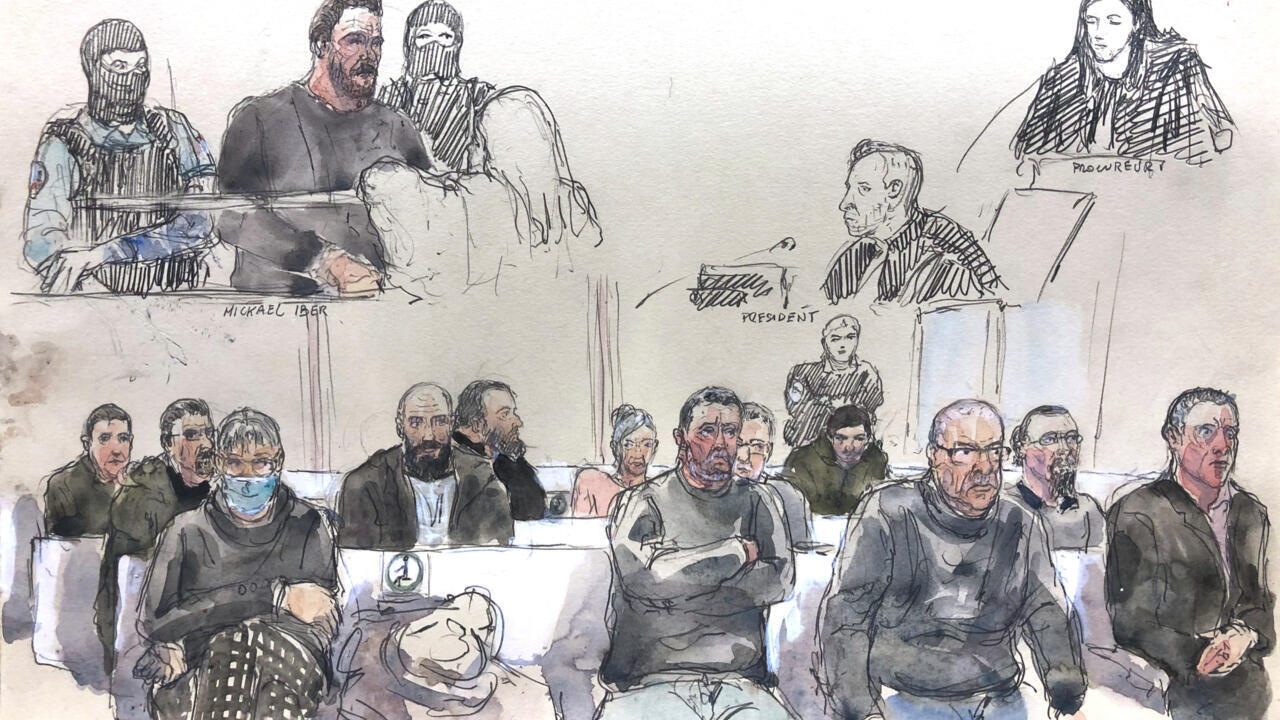France Considers Tougher Sentences For Young Criminals

Table of Contents
The Current State of Juvenile Justice in France
The French juvenile justice system, while aiming for rehabilitation, faces increasing scrutiny regarding its effectiveness in deterring crime and protecting society. Currently, minors are treated differently from adult offenders, with a focus on rehabilitation and reintegration into society. However, critics argue that the current approach is too lenient, contributing to rising crime rates amongst young people.
- Current average sentence lengths: For minor offenses, sentences often involve community service or probation. More serious crimes may result in placement in specialized educational centers or youth detention centers, with sentences varying widely depending on the severity of the crime and the individual circumstances.
- Rehabilitation programs: The system offers various rehabilitation programs focused on education, vocational training, and psychological support. However, the resources available and the effectiveness of these programs are frequently questioned.
- Recidivism rates: Statistics on recidivism among young offenders in France vary, but reports suggest a concerningly high rate of repeat offending, prompting calls for reform.
- Criticisms of the current system: Common criticisms include insufficient deterrence, inadequate resources for rehabilitation programs, and a perceived lack of accountability for young offenders. Concerns also exist about the system's ability to adequately address the needs of victims and their families.
Proposed Changes to Sentencing Guidelines for Young Criminals
The French government is proposing significant changes to sentencing guidelines for young criminals, shifting towards a more punitive approach. These proposals aim to address public concerns about rising youth crime and a perceived lack of accountability within the current system.
- Specific examples of tougher sentences: Proposed changes include extending detention periods for serious offenses, implementing stricter parole conditions, and increasing the use of electronic monitoring.
- Potential changes to the age of criminal responsibility: Discussions are underway about potentially lowering the age of criminal responsibility, currently set at 13 years old for certain offenses.
- Increased focus on punitive measures: The proposed reforms emphasize stricter penalties and a reduction in the emphasis on rehabilitation for certain types of crimes committed by minors.
- Government's reasoning: The government justifies these changes by citing a need to deter crime, protect public safety, and hold young offenders accountable for their actions, particularly in cases involving serious violence or repeat offenses.
Arguments For and Against Tougher Sentences
The debate surrounding tougher sentences for young criminals in France is highly polarized, with strong arguments on both sides.
Arguments in Favor
- Increased public safety and deterrence: Proponents argue that stricter penalties will deter young people from committing crimes, leading to a safer society. This is supported by the argument that harsher consequences will make potential offenders think twice before acting.
- Holding young offenders accountable: Advocates emphasize the importance of holding young offenders accountable for their actions, arguing that leniency sends the wrong message and fails to address the harm caused to victims and their families.
- Addressing the concerns of victims and their families: Many support the changes, emphasizing the need to prioritize the needs and concerns of victims and their families, who often feel that the current system is not adequately addressing their suffering.
- Example: Increased support services for victims and a greater voice in the judicial process are also being discussed.
Arguments Against
- Negative long-term consequences: Critics warn that excessively harsh sentences could have detrimental long-term consequences for young offenders, potentially leading to increased recidivism rates and hindering successful reintegration into society. This approach could create a cycle of crime and punishment.
- Impact on rehabilitation and reintegration: Opponents argue that a greater emphasis on punishment undermines efforts at rehabilitation and reintegration, neglecting the root causes of youth crime, such as poverty, social inequality, and lack of educational opportunities.
- Disproportionate impact on marginalized youth: Concerns exist that tougher sentences could disproportionately affect marginalized youth from disadvantaged backgrounds, exacerbating existing inequalities within the justice system.
- Example: Increased prison overcrowding is also a potential concern, as is the added strain on already limited resources in the youth justice system.
Public Opinion and Political Debate Surrounding the Issue
Public opinion on the proposed changes is divided, mirroring the broader political debate. While some polls suggest significant public support for tougher sentences, particularly in response to high-profile crimes, others reveal considerable opposition.
- Public opinion polls: Recent polls show a fluctuating level of support for tougher sentences, highlighting the complexity and sensitivity of the issue.
- Statements from key political figures: The debate involves key political figures from across the political spectrum, with strong opinions expressed from both sides.
- Political ramifications: The issue carries significant political weight, with implications for upcoming elections and potential shifts in government policy.
- Protests and demonstrations: The debate has led to various protests and public demonstrations, reflecting the passionate engagement of concerned citizens and advocacy groups.
Conclusion
The debate surrounding tougher sentences for young criminals in France is multifaceted, highlighting the inherent tension between public safety, rehabilitation, and the potential for long-term negative consequences. The government's proposed changes, driven by a desire to address rising crime rates, raise critical questions about the appropriate balance between punishment and rehabilitation within the juvenile justice system. Understanding the diverse perspectives and arguments surrounding this issue is crucial for informed public discourse and effective policy-making. To stay informed on the latest developments regarding tougher sentences for young criminals in France, continue to monitor reputable news sources and engage in constructive dialogue on this critical topic.

Featured Posts
-
 Glastonbury 2025 Full Lineup Revealed Following Leak Get Your Tickets Now
May 24, 2025
Glastonbury 2025 Full Lineup Revealed Following Leak Get Your Tickets Now
May 24, 2025 -
 Heinekens Revenue Above Forecast Outlook Confirmed Amid Trade Uncertainty
May 24, 2025
Heinekens Revenue Above Forecast Outlook Confirmed Amid Trade Uncertainty
May 24, 2025 -
 The Future Of Healthcare Analyzing The Philips Future Health Index 2025 And The Role Of Ai
May 24, 2025
The Future Of Healthcare Analyzing The Philips Future Health Index 2025 And The Role Of Ai
May 24, 2025 -
 Musk Zuckerberg Bezos La Lotta Per Il Titolo Di Uomo Piu Ricco Del Mondo Forbes 2025
May 24, 2025
Musk Zuckerberg Bezos La Lotta Per Il Titolo Di Uomo Piu Ricco Del Mondo Forbes 2025
May 24, 2025 -
 Avrupa Hisse Senetleri Duesueste Stoxx Europe 600 Ve Dax 40 Endeksleri Geriledi 16 Nisan 2025
May 24, 2025
Avrupa Hisse Senetleri Duesueste Stoxx Europe 600 Ve Dax 40 Endeksleri Geriledi 16 Nisan 2025
May 24, 2025
Latest Posts
-
 Farrows Plea Hold Trump Accountable For Venezuelan Gang Member Deportations
May 24, 2025
Farrows Plea Hold Trump Accountable For Venezuelan Gang Member Deportations
May 24, 2025 -
 Actress Mia Farrow Trump Should Face Charges For Venezuela Deportation Policy
May 24, 2025
Actress Mia Farrow Trump Should Face Charges For Venezuela Deportation Policy
May 24, 2025 -
 Farrow Seeks Trumps Imprisonment Following Venezuelan Deportation Controversy
May 24, 2025
Farrow Seeks Trumps Imprisonment Following Venezuelan Deportation Controversy
May 24, 2025 -
 Mia Farrows Plea Imprison Trump For Venezuelan Deportation Policy
May 24, 2025
Mia Farrows Plea Imprison Trump For Venezuelan Deportation Policy
May 24, 2025 -
 The Four Women Who Married Frank Sinatra Their Stories And Impact
May 24, 2025
The Four Women Who Married Frank Sinatra Their Stories And Impact
May 24, 2025
